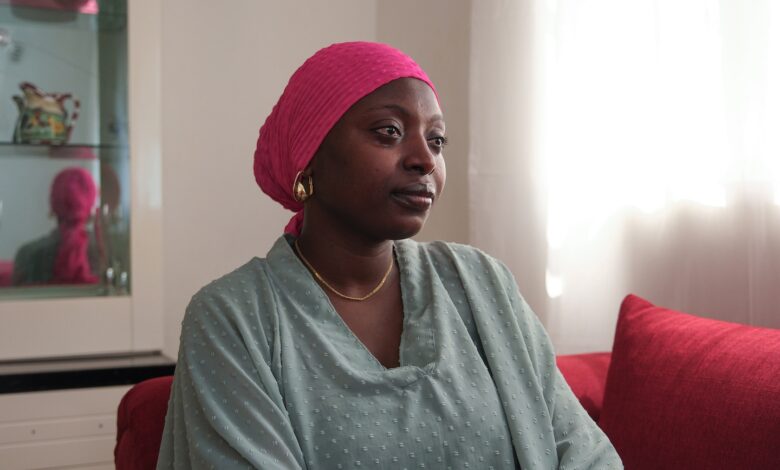As Gambia weighs ending ban on female genital cutting, a secret mutilation

Over the past year, Gambia — a tiny, majority Muslim country — has been engulfed in a nationwide debate about female genital cutting, which is widely known as female genital mutilation (FGM). The oft-heated discussions have been spurred by a bill that would repeal the country’s ban on cutting and thus make Gambia the first country in the world to roll back such a protection.
In March, a large majority of parliament members voted to advance the bill. The health committee then held hearings with doctors, activists and religious scholars before releasing a report earlier this month recommending that the ban, adopted in 2015, be maintained. A final vote is scheduled for July 24, though the bill’s fate could be decided sooner.
Even as arguments have raged throughout Gambia about the practice, girls have continued to be cut, according to activists and government officials, with no punishment for the cutters.
For Fatou, that day last October when she discovered that her daughter, Nyimsin, had been cut began a struggle for accountability, from the government and her own family. Fatou’s story, activists and government officials say, underscores the difficulties of securing justice for such a crime and points to the daunting challenges of ending the practice, especially if the ban is overturned.
When Fatou asked her four-year-old daughter what had happened to her, Nyimsin said “a razor blade hurt me.”
“How?” Fatou pressed her daughter. “Kids don’t play with razor blades. … What were you doing?”
“It wasn’t me,” she recalled her daughter saying as she sat on Fatou’s lap fidgeting. “It was my aunt with my great-aunt,” said Nyimsin, who the The Washington Post is identifying by her nickname to protect her privacy. “They brought a lady and they took me to the backyard, spread my legs out and cut my vagina.”
An offhand remark
When Fatou, now 33, and her younger sister Sirreh Saho were growing up, they never talked about being cut. But when Sirreh was in elementary school, she learned about the potential side effects of FGM, including infections, severe pain, scarring, infertility and loss of pleasure.
Sirreh, now 29 and the more rebellious of the two, started talking about the risks and, later, the trauma of having been taken with her mother’s permission to a toilet and cut at age 4. Fatou, who did not remember her experience of being cut as a baby, began quietly questioning the practice as a young adult.
By the time Fatou was pregnant with Nyimsin, she’d heard how FGM contributed to the near-death of a relative in childbirth. Fatou, a single mother who works as a librarian, had counseled a friend through years of struggles from having her vaginal opening entirely sealed, which is the most extreme form of FGM, and wondered whether cutting was responsible for the gap between the kind of intimacy she saw in movies and what she and her friends experienced.
She was still in her hospital bed after giving birth when the aunts of her then-husband came to check on Nyimsin, and one made an offhand comment about how one day she would be cut.
Fatou recalled mustering the energy to sit up in bed to make sure her point was clear. “My child is not going to go through that,” she said sternly. “Don’t you dare think of it.”
The backlash
The current debate in Gambia over FGM erupted in August after three women were convicted of engaging in the practice. They had been the first to be prosecuted since the ban had been imposed and they faced a potential prison sentence of up to three years or a fine of about $740.
Proponents of the ban celebrated because it seemed the law was finally being enforced.
Then came the backlash. One of Gambia’s most prominent imams, Abdoulie Fatty, paid the women’s fines, saying the practice had been taught by the prophet Muhammad. Fatty then launched a campaign to overturn the ban. (Many Muslim leaders have condemned the practice, and in many Muslim-majority countries, it is not widespread.)
Fatou, traveling at the time in neighboring Senegal, remained glued to this news on her phone, she recounted. She posted a WhatsApp story, saying she wished the women had been jailed.
What she did not know was that back in Gambia her own daughter had already been cut.
The confrontation
When Fatou learned what had been done to her daughter, her first call was to her sister. Sirreh rushed home, then together they called Gambia’s help line, Fatou said. An operator instructed them to head to the nearest police station. Fatou was convinced that her husband’s family was responsible and she wanted to press a case.
The women paid for a taxi to take police officers to her former husband’s house. He demanded to know why they were there.
“You know exactly why police are here,” she recalled telling him.
He looked at her in disbelief, she recounted, as if he couldn’t believe she’d called the police over such a matter and asked: “Why are you acting like you’re not a Muslim?” (He did not respond to requests for comment.)
At the police station the next day, Fatou and Sirreh said they were outnumbered by members of her former husband’s family, who cursed and yelled. Her former husband said he’d given his permission.
Stone-faced police officers told them to come back another day.
A difficult fight
The sisters knew they needed help. A mutual friend connected them with Fatou Baldeh, an internationally recognized Gambian activist opposed to FGM.
Baldeh said in an interview that Fatou Saho’s story reflects the reality that often it is the extended family, not the parents, who decide that girls will be cut. Her decision to pursue a criminal case, Baldeh said, was rare.
When Baldeh joined the sisters back at the police station the following Monday, it became clear how difficult the fight would be.
A supervising officer looked at Nyimsin and declared that she looked “fine,” Baldeh recounted. The officer said he had received orders not move forward on such cases because of the ongoing national debate, according to Baldeh and Fatou.
Eventually, a junior officer named Sarata Saidykhan accompanied the women to the hospital, where the women said a doctor confirmed that Nyimsin had been subject to “Type 1,” cutting, which involves the partial or complete removal of the clitoris.
Asked about the case, Saidykhan said in an interview that the case file had been transferred to the capital, Banjul, about 16 miles away, and declined to respond to other questions. At police headquarters in Banjul, Post journalists were directed to a press officer, who did not have information about the case.
A ‘good woman’
Late last week, Fatou and Sirreh were in the audience as Baldeh presented the findings of her organization, Women in Liberation & Leadership, prepared in connection with the parliamentary debate over FGM. Urging that the ban be retained, Baldeh described the deaths that cutting has reportedly caused.
Fatou felt her eyes well up and tears begin to fall. “What if my child died and I wasn’t around?” she later recalled thinking, as fresh tears fell. “What would they have told me?”
For now, Fatou’s case appears to have stalled, after months of canceled court dates and calls to the police.
Fatty, the imam promoting the ban’s repeal, appeared to refer to Fatou’s story in a sermon earlier this year, saying that a woman who takes her husband to court should be “ashamed.” Fatty compared her story with that story of a “good woman” who refused to take her husband to court even after he beat her so badly she lost four teeth.
Fatou has tried to brush off the pressure and ignore the stares she sometimes gets. Instead, she’s focusing on her daughter’s interests. She knows how much Nyimsin loves her father and has heard her say she hopes he isn’t “locked up.” But Fatou also still believes her daughter deserves justice and that the law must be applied — for the sake of all Gambian girls.
Mostly, she prays that Nyimsin will not suffer the complications that so many women have. But if there are complications, Fatou said, she will be there for her daughter and they will face them together.
Ramatoulie Jawo contributed to this report.






